Entrepreneurship Report: Ventures, Impact, and Personality
VerifiedAdded on 2020/02/03
|14
|4712
|111
Report
AI Summary
This report provides a comprehensive overview of entrepreneurship, encompassing various types of entrepreneurial ventures such as Schumpeterian, Intrapreneur, Established, and Social Good Enterprises. It delves into the similarities and differences between these ventures, highlighting the importance of risk-taking, innovation, and creativity. The report further analyzes the impact of micro and small businesses on the economy, emphasizing their role in job creation and economic growth. It explores how small businesses and start-ups contribute to the social economy, fostering economic growth and social development. Additionally, the report identifies the characteristics, traits, and skills of successful entrepreneurs, distinguishing them from traditional business managers. It also examines the role of entrepreneurial personality, motivation, and mindset, along with how background and experience can influence entrepreneurial endeavors. The report concludes with a synthesis of these key aspects of entrepreneurship, providing valuable insights into the field.

ENTREPRENEURSHIP
Paraphrase This Document
Need a fresh take? Get an instant paraphrase of this document with our AI Paraphraser
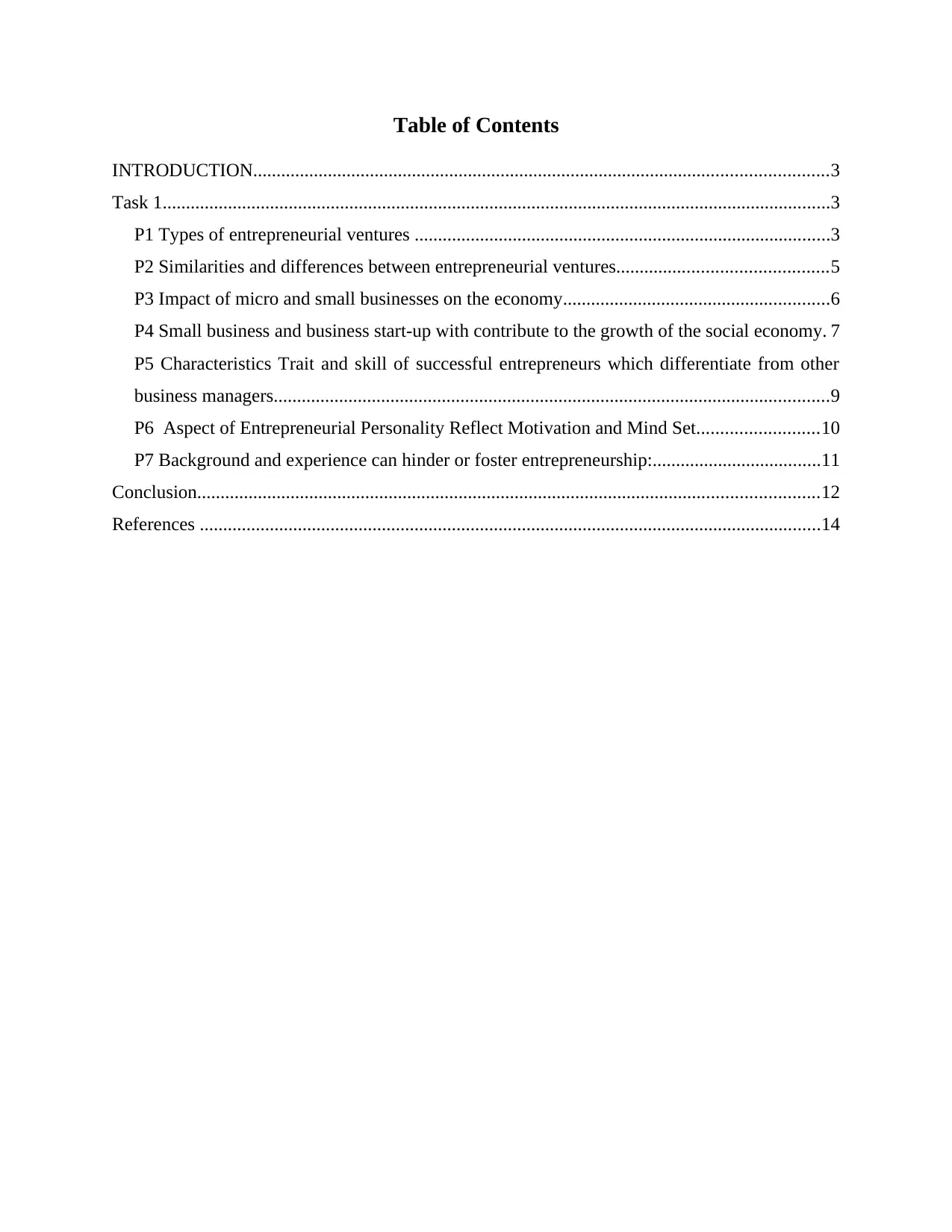
Table of Contents
INTRODUCTION...........................................................................................................................3
Task 1...............................................................................................................................................3
P1 Types of entrepreneurial ventures .........................................................................................3
P2 Similarities and differences between entrepreneurial ventures.............................................5
P3 Impact of micro and small businesses on the economy.........................................................6
P4 Small business and business start-up with contribute to the growth of the social economy. 7
P5 Characteristics Trait and skill of successful entrepreneurs which differentiate from other
business managers.......................................................................................................................9
P6 Aspect of Entrepreneurial Personality Reflect Motivation and Mind Set..........................10
P7 Background and experience can hinder or foster entrepreneurship:....................................11
Conclusion.....................................................................................................................................12
References .....................................................................................................................................14
INTRODUCTION...........................................................................................................................3
Task 1...............................................................................................................................................3
P1 Types of entrepreneurial ventures .........................................................................................3
P2 Similarities and differences between entrepreneurial ventures.............................................5
P3 Impact of micro and small businesses on the economy.........................................................6
P4 Small business and business start-up with contribute to the growth of the social economy. 7
P5 Characteristics Trait and skill of successful entrepreneurs which differentiate from other
business managers.......................................................................................................................9
P6 Aspect of Entrepreneurial Personality Reflect Motivation and Mind Set..........................10
P7 Background and experience can hinder or foster entrepreneurship:....................................11
Conclusion.....................................................................................................................................12
References .....................................................................................................................................14
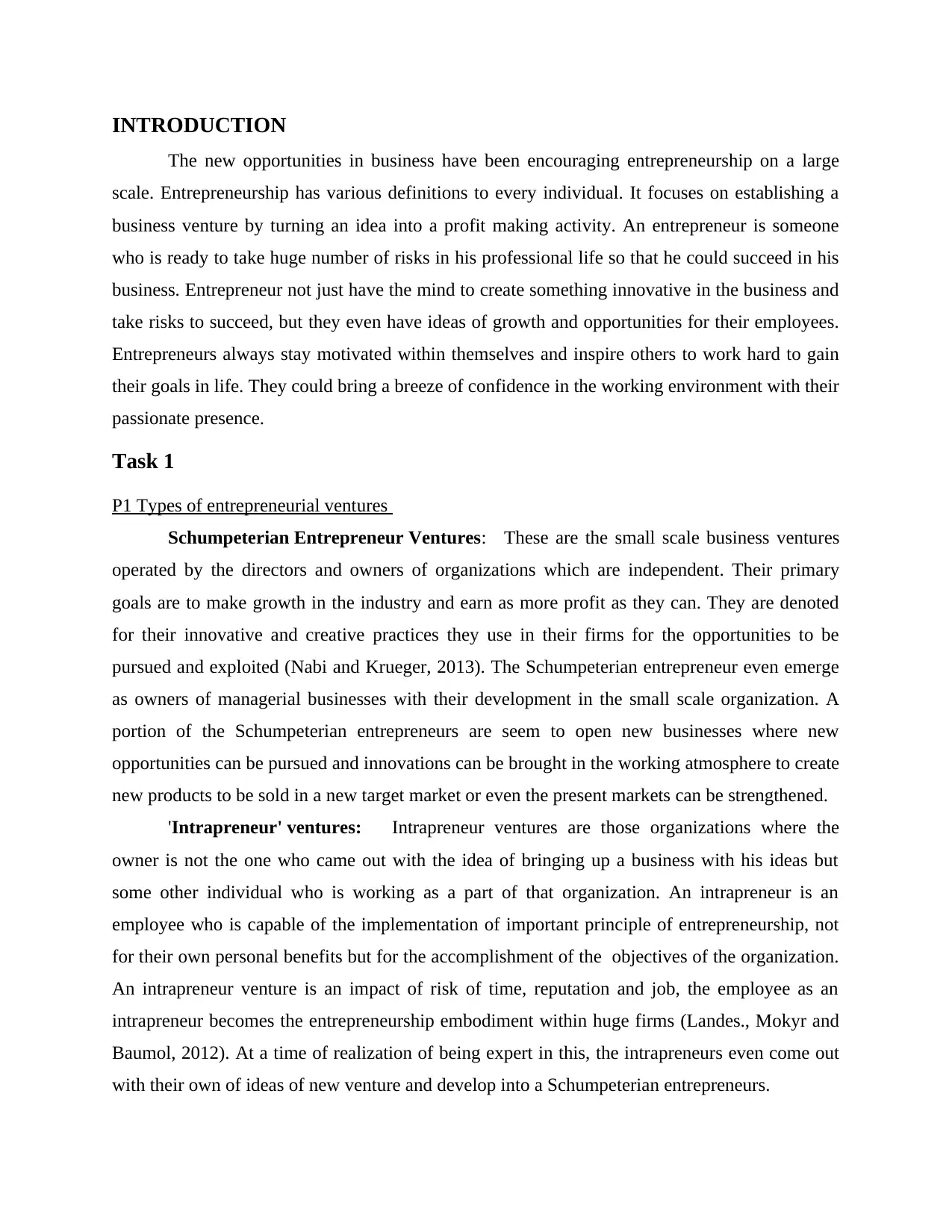
INTRODUCTION
The new opportunities in business have been encouraging entrepreneurship on a large
scale. Entrepreneurship has various definitions to every individual. It focuses on establishing a
business venture by turning an idea into a profit making activity. An entrepreneur is someone
who is ready to take huge number of risks in his professional life so that he could succeed in his
business. Entrepreneur not just have the mind to create something innovative in the business and
take risks to succeed, but they even have ideas of growth and opportunities for their employees.
Entrepreneurs always stay motivated within themselves and inspire others to work hard to gain
their goals in life. They could bring a breeze of confidence in the working environment with their
passionate presence.
Task 1
P1 Types of entrepreneurial ventures
Schumpeterian Entrepreneur Ventures: These are the small scale business ventures
operated by the directors and owners of organizations which are independent. Their primary
goals are to make growth in the industry and earn as more profit as they can. They are denoted
for their innovative and creative practices they use in their firms for the opportunities to be
pursued and exploited (Nabi and Krueger, 2013). The Schumpeterian entrepreneur even emerge
as owners of managerial businesses with their development in the small scale organization. A
portion of the Schumpeterian entrepreneurs are seem to open new businesses where new
opportunities can be pursued and innovations can be brought in the working atmosphere to create
new products to be sold in a new target market or even the present markets can be strengthened.
'Intrapreneur' ventures: Intrapreneur ventures are those organizations where the
owner is not the one who came out with the idea of bringing up a business with his ideas but
some other individual who is working as a part of that organization. An intrapreneur is an
employee who is capable of the implementation of important principle of entrepreneurship, not
for their own personal benefits but for the accomplishment of the objectives of the organization.
An intrapreneur venture is an impact of risk of time, reputation and job, the employee as an
intrapreneur becomes the entrepreneurship embodiment within huge firms (Landes., Mokyr and
Baumol, 2012). At a time of realization of being expert in this, the intrapreneurs even come out
with their own of ideas of new venture and develop into a Schumpeterian entrepreneurs.
The new opportunities in business have been encouraging entrepreneurship on a large
scale. Entrepreneurship has various definitions to every individual. It focuses on establishing a
business venture by turning an idea into a profit making activity. An entrepreneur is someone
who is ready to take huge number of risks in his professional life so that he could succeed in his
business. Entrepreneur not just have the mind to create something innovative in the business and
take risks to succeed, but they even have ideas of growth and opportunities for their employees.
Entrepreneurs always stay motivated within themselves and inspire others to work hard to gain
their goals in life. They could bring a breeze of confidence in the working environment with their
passionate presence.
Task 1
P1 Types of entrepreneurial ventures
Schumpeterian Entrepreneur Ventures: These are the small scale business ventures
operated by the directors and owners of organizations which are independent. Their primary
goals are to make growth in the industry and earn as more profit as they can. They are denoted
for their innovative and creative practices they use in their firms for the opportunities to be
pursued and exploited (Nabi and Krueger, 2013). The Schumpeterian entrepreneur even emerge
as owners of managerial businesses with their development in the small scale organization. A
portion of the Schumpeterian entrepreneurs are seem to open new businesses where new
opportunities can be pursued and innovations can be brought in the working atmosphere to create
new products to be sold in a new target market or even the present markets can be strengthened.
'Intrapreneur' ventures: Intrapreneur ventures are those organizations where the
owner is not the one who came out with the idea of bringing up a business with his ideas but
some other individual who is working as a part of that organization. An intrapreneur is an
employee who is capable of the implementation of important principle of entrepreneurship, not
for their own personal benefits but for the accomplishment of the objectives of the organization.
An intrapreneur venture is an impact of risk of time, reputation and job, the employee as an
intrapreneur becomes the entrepreneurship embodiment within huge firms (Landes., Mokyr and
Baumol, 2012). At a time of realization of being expert in this, the intrapreneurs even come out
with their own of ideas of new venture and develop into a Schumpeterian entrepreneurs.
⊘ This is a preview!⊘
Do you want full access?
Subscribe today to unlock all pages.

Trusted by 1+ million students worldwide
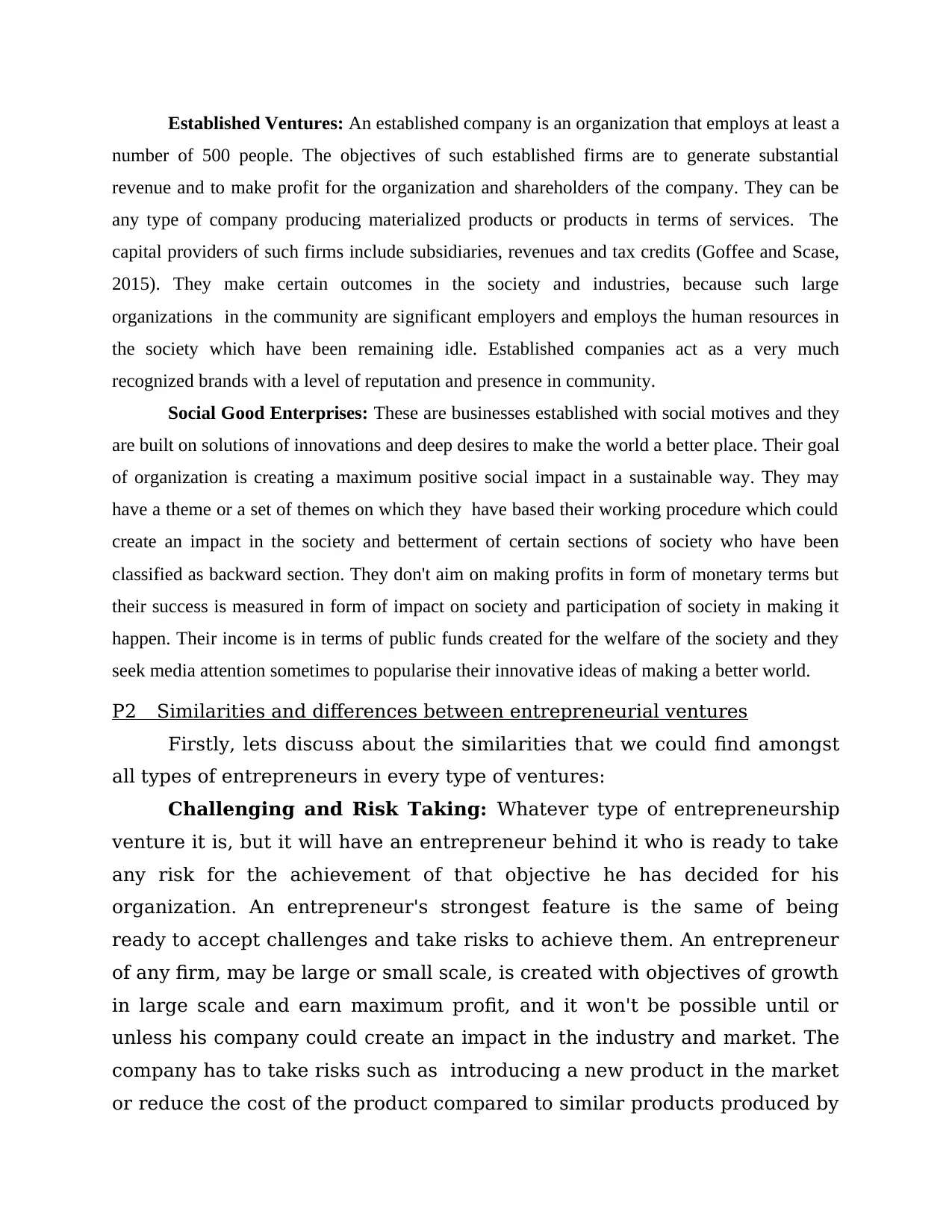
Established Ventures: An established company is an organization that employs at least a
number of 500 people. The objectives of such established firms are to generate substantial
revenue and to make profit for the organization and shareholders of the company. They can be
any type of company producing materialized products or products in terms of services. The
capital providers of such firms include subsidiaries, revenues and tax credits (Goffee and Scase,
2015). They make certain outcomes in the society and industries, because such large
organizations in the community are significant employers and employs the human resources in
the society which have been remaining idle. Established companies act as a very much
recognized brands with a level of reputation and presence in community.
Social Good Enterprises: These are businesses established with social motives and they
are built on solutions of innovations and deep desires to make the world a better place. Their goal
of organization is creating a maximum positive social impact in a sustainable way. They may
have a theme or a set of themes on which they have based their working procedure which could
create an impact in the society and betterment of certain sections of society who have been
classified as backward section. They don't aim on making profits in form of monetary terms but
their success is measured in form of impact on society and participation of society in making it
happen. Their income is in terms of public funds created for the welfare of the society and they
seek media attention sometimes to popularise their innovative ideas of making a better world.
P2 Similarities and differences between entrepreneurial ventures
Firstly, lets discuss about the similarities that we could find amongst
all types of entrepreneurs in every type of ventures:
Challenging and Risk Taking: Whatever type of entrepreneurship
venture it is, but it will have an entrepreneur behind it who is ready to take
any risk for the achievement of that objective he has decided for his
organization. An entrepreneur's strongest feature is the same of being
ready to accept challenges and take risks to achieve them. An entrepreneur
of any firm, may be large or small scale, is created with objectives of growth
in large scale and earn maximum profit, and it won't be possible until or
unless his company could create an impact in the industry and market. The
company has to take risks such as introducing a new product in the market
or reduce the cost of the product compared to similar products produced by
number of 500 people. The objectives of such established firms are to generate substantial
revenue and to make profit for the organization and shareholders of the company. They can be
any type of company producing materialized products or products in terms of services. The
capital providers of such firms include subsidiaries, revenues and tax credits (Goffee and Scase,
2015). They make certain outcomes in the society and industries, because such large
organizations in the community are significant employers and employs the human resources in
the society which have been remaining idle. Established companies act as a very much
recognized brands with a level of reputation and presence in community.
Social Good Enterprises: These are businesses established with social motives and they
are built on solutions of innovations and deep desires to make the world a better place. Their goal
of organization is creating a maximum positive social impact in a sustainable way. They may
have a theme or a set of themes on which they have based their working procedure which could
create an impact in the society and betterment of certain sections of society who have been
classified as backward section. They don't aim on making profits in form of monetary terms but
their success is measured in form of impact on society and participation of society in making it
happen. Their income is in terms of public funds created for the welfare of the society and they
seek media attention sometimes to popularise their innovative ideas of making a better world.
P2 Similarities and differences between entrepreneurial ventures
Firstly, lets discuss about the similarities that we could find amongst
all types of entrepreneurs in every type of ventures:
Challenging and Risk Taking: Whatever type of entrepreneurship
venture it is, but it will have an entrepreneur behind it who is ready to take
any risk for the achievement of that objective he has decided for his
organization. An entrepreneur's strongest feature is the same of being
ready to accept challenges and take risks to achieve them. An entrepreneur
of any firm, may be large or small scale, is created with objectives of growth
in large scale and earn maximum profit, and it won't be possible until or
unless his company could create an impact in the industry and market. The
company has to take risks such as introducing a new product in the market
or reduce the cost of the product compared to similar products produced by
Paraphrase This Document
Need a fresh take? Get an instant paraphrase of this document with our AI Paraphraser
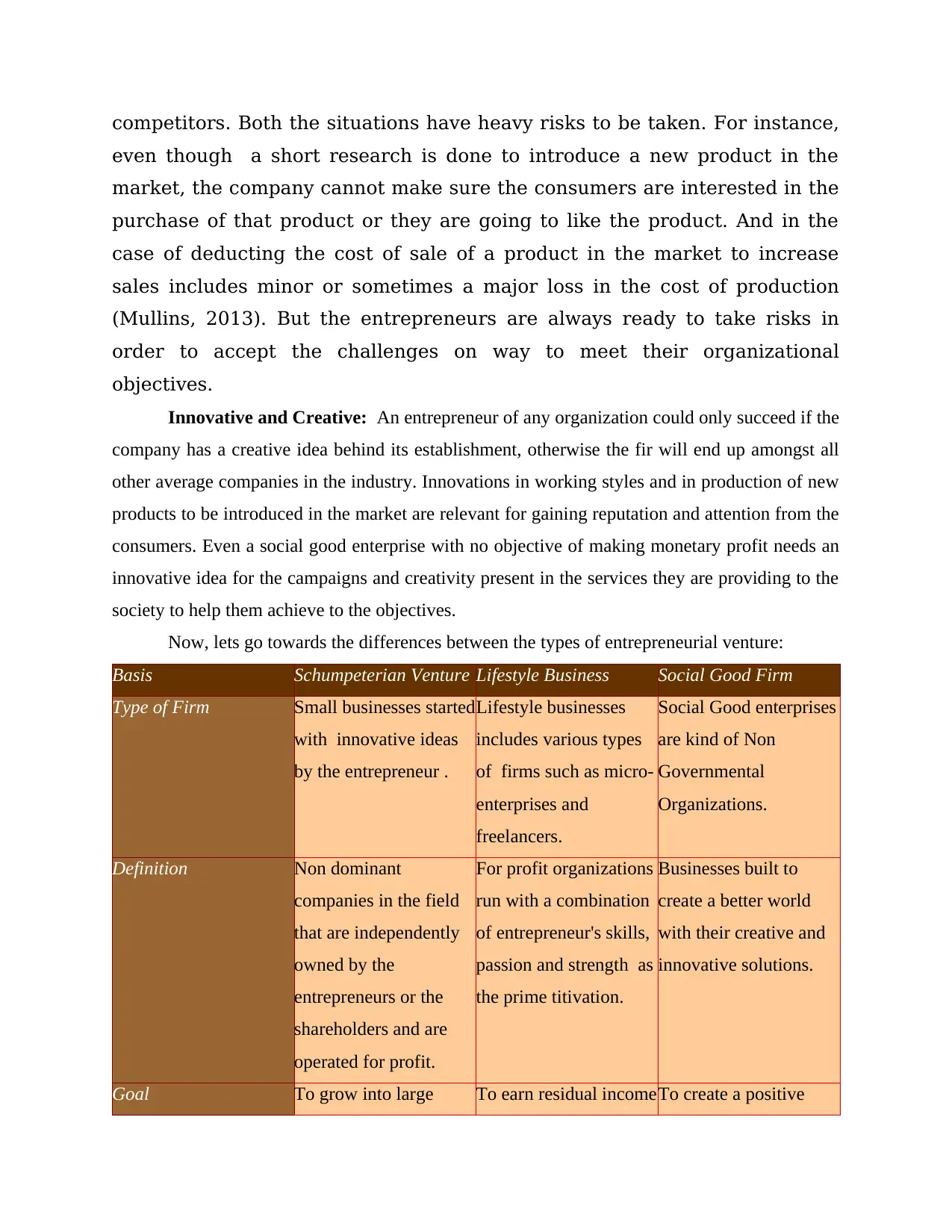
competitors. Both the situations have heavy risks to be taken. For instance,
even though a short research is done to introduce a new product in the
market, the company cannot make sure the consumers are interested in the
purchase of that product or they are going to like the product. And in the
case of deducting the cost of sale of a product in the market to increase
sales includes minor or sometimes a major loss in the cost of production
(Mullins, 2013). But the entrepreneurs are always ready to take risks in
order to accept the challenges on way to meet their organizational
objectives.
Innovative and Creative: An entrepreneur of any organization could only succeed if the
company has a creative idea behind its establishment, otherwise the fir will end up amongst all
other average companies in the industry. Innovations in working styles and in production of new
products to be introduced in the market are relevant for gaining reputation and attention from the
consumers. Even a social good enterprise with no objective of making monetary profit needs an
innovative idea for the campaigns and creativity present in the services they are providing to the
society to help them achieve to the objectives.
Now, lets go towards the differences between the types of entrepreneurial venture:
Basis Schumpeterian Venture Lifestyle Business Social Good Firm
Type of Firm Small businesses started
with innovative ideas
by the entrepreneur .
Lifestyle businesses
includes various types
of firms such as micro-
enterprises and
freelancers.
Social Good enterprises
are kind of Non
Governmental
Organizations.
Definition Non dominant
companies in the field
that are independently
owned by the
entrepreneurs or the
shareholders and are
operated for profit.
For profit organizations
run with a combination
of entrepreneur's skills,
passion and strength as
the prime titivation.
Businesses built to
create a better world
with their creative and
innovative solutions.
Goal To grow into large To earn residual incomeTo create a positive
even though a short research is done to introduce a new product in the
market, the company cannot make sure the consumers are interested in the
purchase of that product or they are going to like the product. And in the
case of deducting the cost of sale of a product in the market to increase
sales includes minor or sometimes a major loss in the cost of production
(Mullins, 2013). But the entrepreneurs are always ready to take risks in
order to accept the challenges on way to meet their organizational
objectives.
Innovative and Creative: An entrepreneur of any organization could only succeed if the
company has a creative idea behind its establishment, otherwise the fir will end up amongst all
other average companies in the industry. Innovations in working styles and in production of new
products to be introduced in the market are relevant for gaining reputation and attention from the
consumers. Even a social good enterprise with no objective of making monetary profit needs an
innovative idea for the campaigns and creativity present in the services they are providing to the
society to help them achieve to the objectives.
Now, lets go towards the differences between the types of entrepreneurial venture:
Basis Schumpeterian Venture Lifestyle Business Social Good Firm
Type of Firm Small businesses started
with innovative ideas
by the entrepreneur .
Lifestyle businesses
includes various types
of firms such as micro-
enterprises and
freelancers.
Social Good enterprises
are kind of Non
Governmental
Organizations.
Definition Non dominant
companies in the field
that are independently
owned by the
entrepreneurs or the
shareholders and are
operated for profit.
For profit organizations
run with a combination
of entrepreneur's skills,
passion and strength as
the prime titivation.
Businesses built to
create a better world
with their creative and
innovative solutions.
Goal To grow into large To earn residual incomeTo create a positive
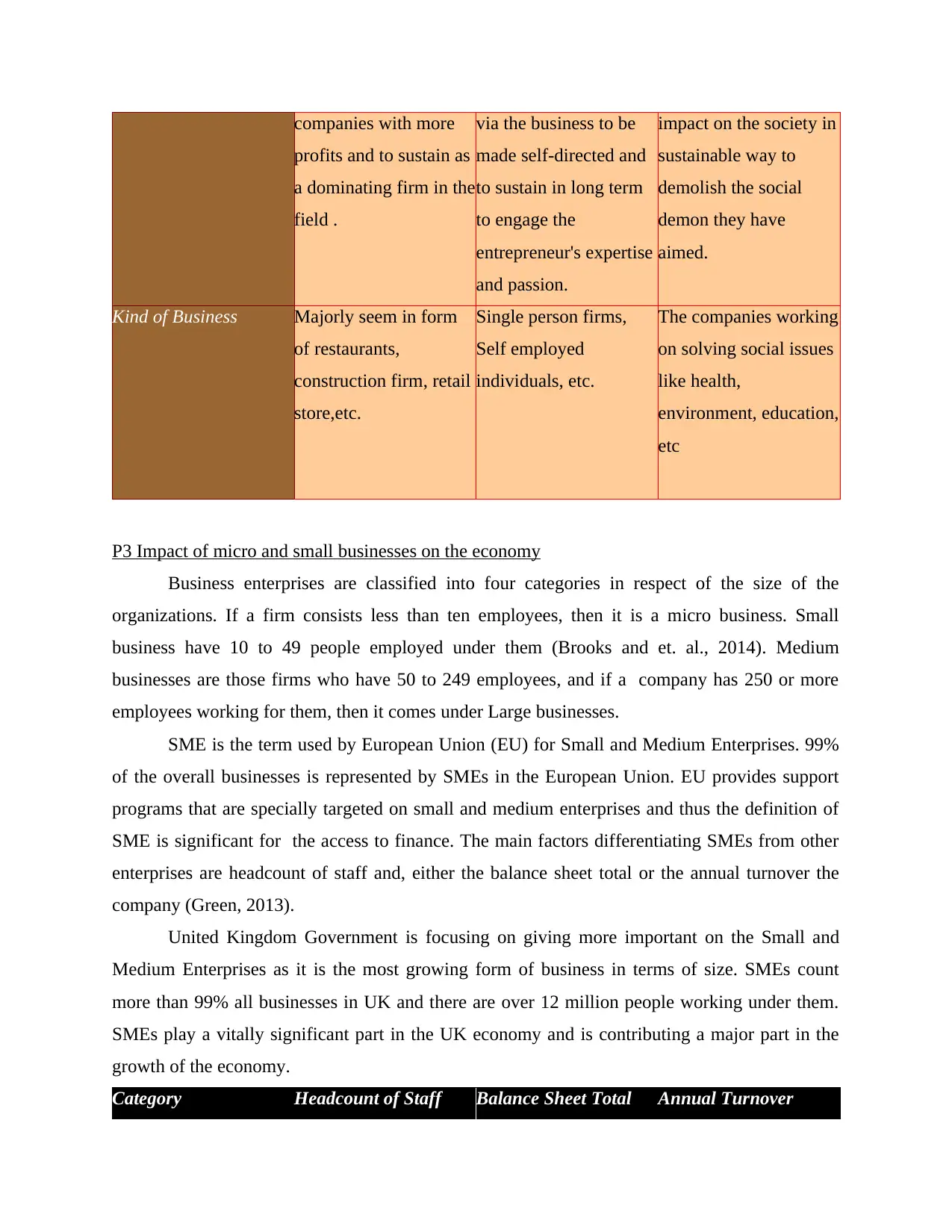
companies with more
profits and to sustain as
a dominating firm in the
field .
via the business to be
made self-directed and
to sustain in long term
to engage the
entrepreneur's expertise
and passion.
impact on the society in
sustainable way to
demolish the social
demon they have
aimed.
Kind of Business Majorly seem in form
of restaurants,
construction firm, retail
store,etc.
Single person firms,
Self employed
individuals, etc.
The companies working
on solving social issues
like health,
environment, education,
etc
P3 Impact of micro and small businesses on the economy
Business enterprises are classified into four categories in respect of the size of the
organizations. If a firm consists less than ten employees, then it is a micro business. Small
business have 10 to 49 people employed under them (Brooks and et. al., 2014). Medium
businesses are those firms who have 50 to 249 employees, and if a company has 250 or more
employees working for them, then it comes under Large businesses.
SME is the term used by European Union (EU) for Small and Medium Enterprises. 99%
of the overall businesses is represented by SMEs in the European Union. EU provides support
programs that are specially targeted on small and medium enterprises and thus the definition of
SME is significant for the access to finance. The main factors differentiating SMEs from other
enterprises are headcount of staff and, either the balance sheet total or the annual turnover the
company (Green, 2013).
United Kingdom Government is focusing on giving more important on the Small and
Medium Enterprises as it is the most growing form of business in terms of size. SMEs count
more than 99% all businesses in UK and there are over 12 million people working under them.
SMEs play a vitally significant part in the UK economy and is contributing a major part in the
growth of the economy.
Category Headcount of Staff Balance Sheet Total Annual Turnover
profits and to sustain as
a dominating firm in the
field .
via the business to be
made self-directed and
to sustain in long term
to engage the
entrepreneur's expertise
and passion.
impact on the society in
sustainable way to
demolish the social
demon they have
aimed.
Kind of Business Majorly seem in form
of restaurants,
construction firm, retail
store,etc.
Single person firms,
Self employed
individuals, etc.
The companies working
on solving social issues
like health,
environment, education,
etc
P3 Impact of micro and small businesses on the economy
Business enterprises are classified into four categories in respect of the size of the
organizations. If a firm consists less than ten employees, then it is a micro business. Small
business have 10 to 49 people employed under them (Brooks and et. al., 2014). Medium
businesses are those firms who have 50 to 249 employees, and if a company has 250 or more
employees working for them, then it comes under Large businesses.
SME is the term used by European Union (EU) for Small and Medium Enterprises. 99%
of the overall businesses is represented by SMEs in the European Union. EU provides support
programs that are specially targeted on small and medium enterprises and thus the definition of
SME is significant for the access to finance. The main factors differentiating SMEs from other
enterprises are headcount of staff and, either the balance sheet total or the annual turnover the
company (Green, 2013).
United Kingdom Government is focusing on giving more important on the Small and
Medium Enterprises as it is the most growing form of business in terms of size. SMEs count
more than 99% all businesses in UK and there are over 12 million people working under them.
SMEs play a vitally significant part in the UK economy and is contributing a major part in the
growth of the economy.
Category Headcount of Staff Balance Sheet Total Annual Turnover
⊘ This is a preview!⊘
Do you want full access?
Subscribe today to unlock all pages.

Trusted by 1+ million students worldwide
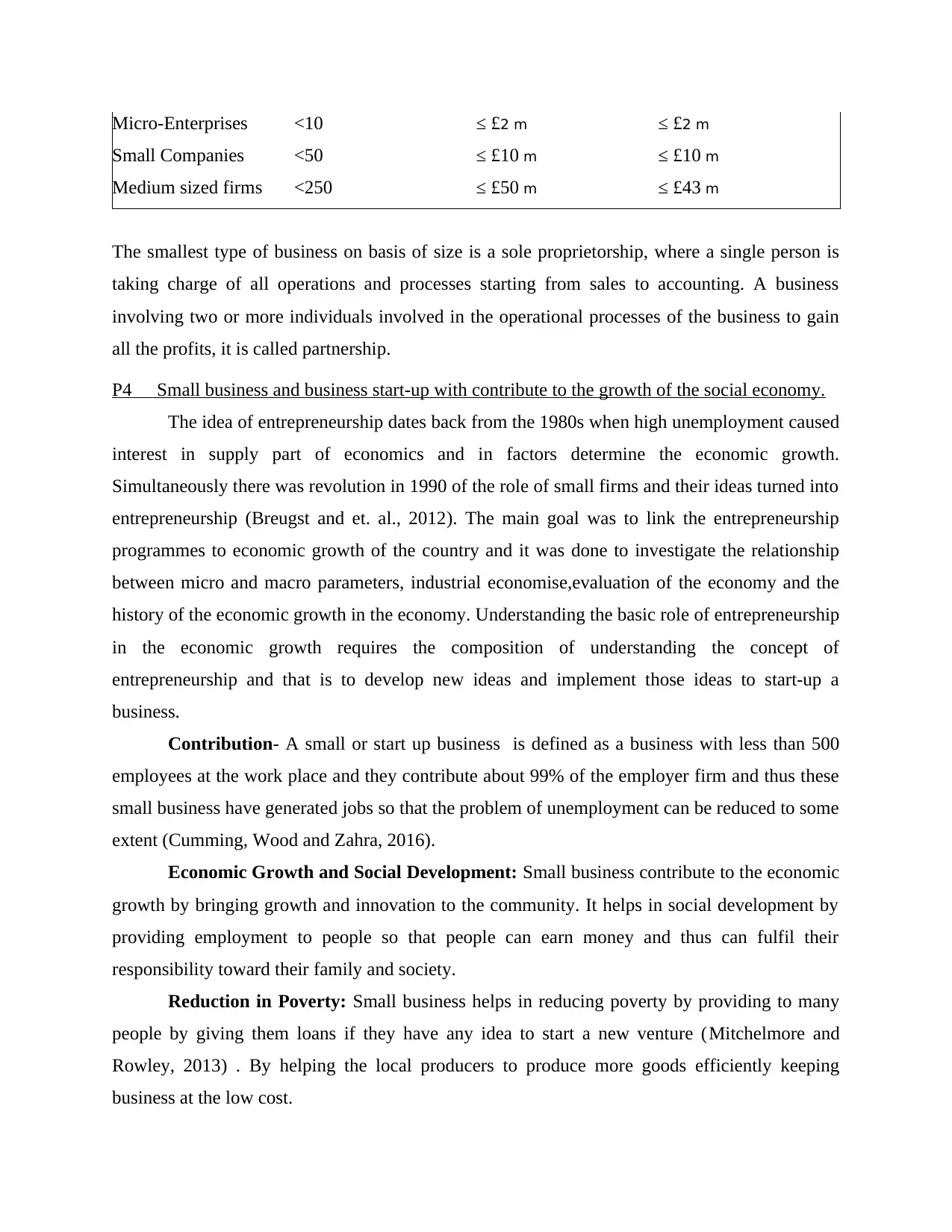
Micro-Enterprises <10 ≤ £2 m ≤ £2 m
Small Companies <50 ≤ £10 m ≤ £10 m
Medium sized firms <250 ≤ £50 m ≤ £43 m
The smallest type of business on basis of size is a sole proprietorship, where a single person is
taking charge of all operations and processes starting from sales to accounting. A business
involving two or more individuals involved in the operational processes of the business to gain
all the profits, it is called partnership.
P4 Small business and business start-up with contribute to the growth of the social economy.
The idea of entrepreneurship dates back from the 1980s when high unemployment caused
interest in supply part of economics and in factors determine the economic growth.
Simultaneously there was revolution in 1990 of the role of small firms and their ideas turned into
entrepreneurship (Breugst and et. al., 2012). The main goal was to link the entrepreneurship
programmes to economic growth of the country and it was done to investigate the relationship
between micro and macro parameters, industrial economise,evaluation of the economy and the
history of the economic growth in the economy. Understanding the basic role of entrepreneurship
in the economic growth requires the composition of understanding the concept of
entrepreneurship and that is to develop new ideas and implement those ideas to start-up a
business.
Contribution- A small or start up business is defined as a business with less than 500
employees at the work place and they contribute about 99% of the employer firm and thus these
small business have generated jobs so that the problem of unemployment can be reduced to some
extent (Cumming, Wood and Zahra, 2016).
Economic Growth and Social Development: Small business contribute to the economic
growth by bringing growth and innovation to the community. It helps in social development by
providing employment to people so that people can earn money and thus can fulfil their
responsibility toward their family and society.
Reduction in Poverty: Small business helps in reducing poverty by providing to many
people by giving them loans if they have any idea to start a new venture (Mitchelmore and
Rowley, 2013) . By helping the local producers to produce more goods efficiently keeping
business at the low cost.
Small Companies <50 ≤ £10 m ≤ £10 m
Medium sized firms <250 ≤ £50 m ≤ £43 m
The smallest type of business on basis of size is a sole proprietorship, where a single person is
taking charge of all operations and processes starting from sales to accounting. A business
involving two or more individuals involved in the operational processes of the business to gain
all the profits, it is called partnership.
P4 Small business and business start-up with contribute to the growth of the social economy.
The idea of entrepreneurship dates back from the 1980s when high unemployment caused
interest in supply part of economics and in factors determine the economic growth.
Simultaneously there was revolution in 1990 of the role of small firms and their ideas turned into
entrepreneurship (Breugst and et. al., 2012). The main goal was to link the entrepreneurship
programmes to economic growth of the country and it was done to investigate the relationship
between micro and macro parameters, industrial economise,evaluation of the economy and the
history of the economic growth in the economy. Understanding the basic role of entrepreneurship
in the economic growth requires the composition of understanding the concept of
entrepreneurship and that is to develop new ideas and implement those ideas to start-up a
business.
Contribution- A small or start up business is defined as a business with less than 500
employees at the work place and they contribute about 99% of the employer firm and thus these
small business have generated jobs so that the problem of unemployment can be reduced to some
extent (Cumming, Wood and Zahra, 2016).
Economic Growth and Social Development: Small business contribute to the economic
growth by bringing growth and innovation to the community. It helps in social development by
providing employment to people so that people can earn money and thus can fulfil their
responsibility toward their family and society.
Reduction in Poverty: Small business helps in reducing poverty by providing to many
people by giving them loans if they have any idea to start a new venture (Mitchelmore and
Rowley, 2013) . By helping the local producers to produce more goods efficiently keeping
business at the low cost.
Paraphrase This Document
Need a fresh take? Get an instant paraphrase of this document with our AI Paraphraser
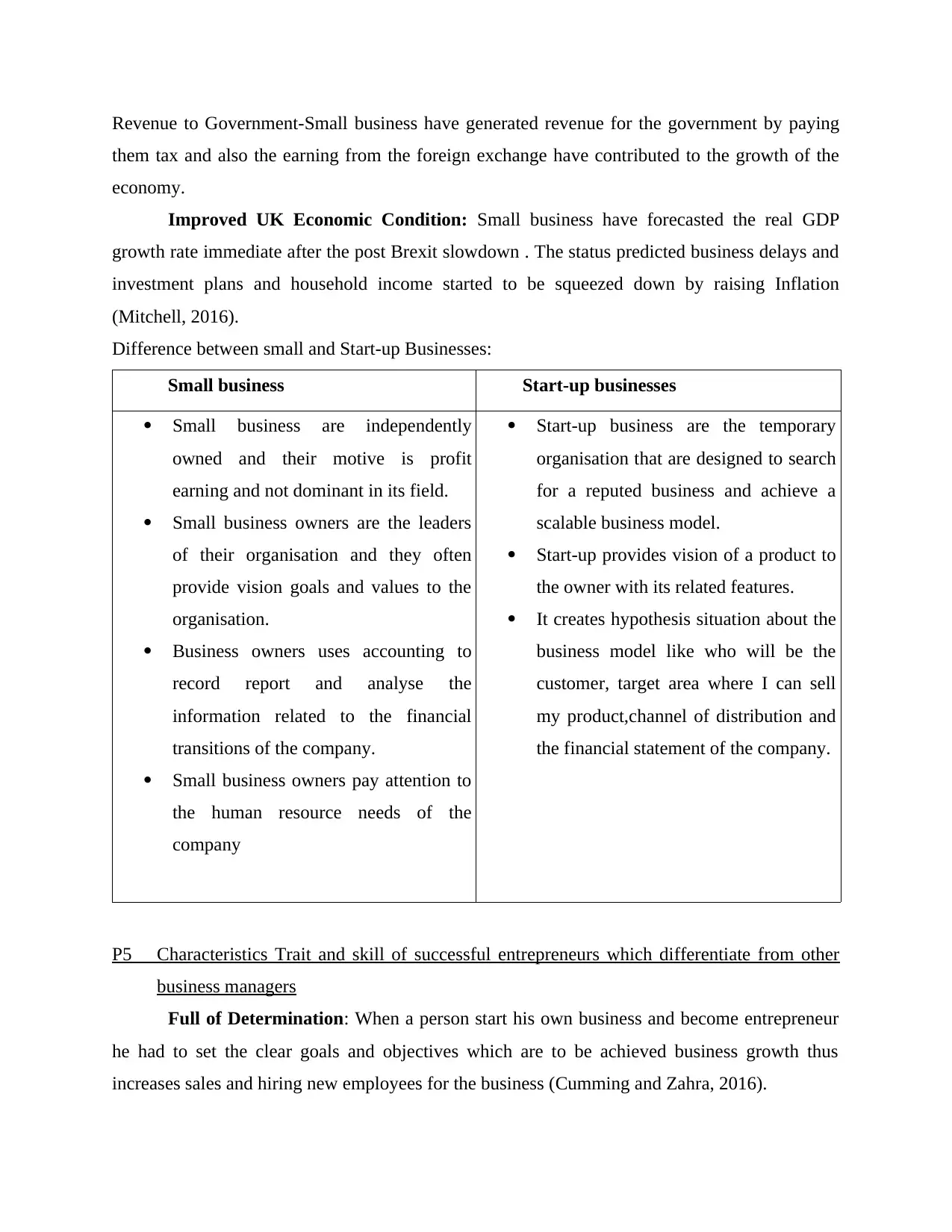
Revenue to Government-Small business have generated revenue for the government by paying
them tax and also the earning from the foreign exchange have contributed to the growth of the
economy.
Improved UK Economic Condition: Small business have forecasted the real GDP
growth rate immediate after the post Brexit slowdown . The status predicted business delays and
investment plans and household income started to be squeezed down by raising Inflation
(Mitchell, 2016).
Difference between small and Start-up Businesses:
Small business Start-up businesses
Small business are independently
owned and their motive is profit
earning and not dominant in its field.
Small business owners are the leaders
of their organisation and they often
provide vision goals and values to the
organisation.
Business owners uses accounting to
record report and analyse the
information related to the financial
transitions of the company.
Small business owners pay attention to
the human resource needs of the
company
Start-up business are the temporary
organisation that are designed to search
for a reputed business and achieve a
scalable business model.
Start-up provides vision of a product to
the owner with its related features.
It creates hypothesis situation about the
business model like who will be the
customer, target area where I can sell
my product,channel of distribution and
the financial statement of the company.
P5 Characteristics Trait and skill of successful entrepreneurs which differentiate from other
business managers
Full of Determination: When a person start his own business and become entrepreneur
he had to set the clear goals and objectives which are to be achieved business growth thus
increases sales and hiring new employees for the business (Cumming and Zahra, 2016).
them tax and also the earning from the foreign exchange have contributed to the growth of the
economy.
Improved UK Economic Condition: Small business have forecasted the real GDP
growth rate immediate after the post Brexit slowdown . The status predicted business delays and
investment plans and household income started to be squeezed down by raising Inflation
(Mitchell, 2016).
Difference between small and Start-up Businesses:
Small business Start-up businesses
Small business are independently
owned and their motive is profit
earning and not dominant in its field.
Small business owners are the leaders
of their organisation and they often
provide vision goals and values to the
organisation.
Business owners uses accounting to
record report and analyse the
information related to the financial
transitions of the company.
Small business owners pay attention to
the human resource needs of the
company
Start-up business are the temporary
organisation that are designed to search
for a reputed business and achieve a
scalable business model.
Start-up provides vision of a product to
the owner with its related features.
It creates hypothesis situation about the
business model like who will be the
customer, target area where I can sell
my product,channel of distribution and
the financial statement of the company.
P5 Characteristics Trait and skill of successful entrepreneurs which differentiate from other
business managers
Full of Determination: When a person start his own business and become entrepreneur
he had to set the clear goals and objectives which are to be achieved business growth thus
increases sales and hiring new employees for the business (Cumming and Zahra, 2016).
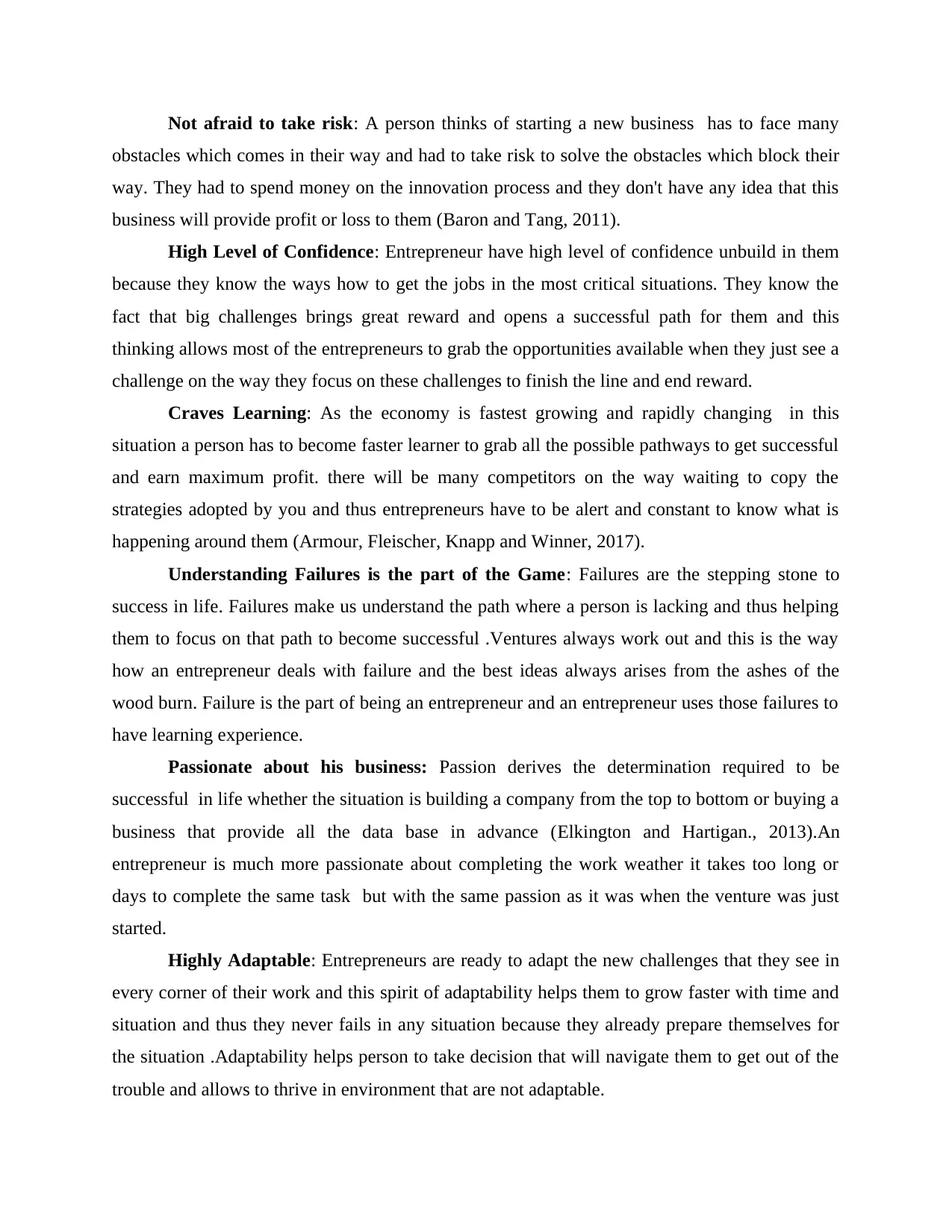
Not afraid to take risk: A person thinks of starting a new business has to face many
obstacles which comes in their way and had to take risk to solve the obstacles which block their
way. They had to spend money on the innovation process and they don't have any idea that this
business will provide profit or loss to them (Baron and Tang, 2011).
High Level of Confidence: Entrepreneur have high level of confidence unbuild in them
because they know the ways how to get the jobs in the most critical situations. They know the
fact that big challenges brings great reward and opens a successful path for them and this
thinking allows most of the entrepreneurs to grab the opportunities available when they just see a
challenge on the way they focus on these challenges to finish the line and end reward.
Craves Learning: As the economy is fastest growing and rapidly changing in this
situation a person has to become faster learner to grab all the possible pathways to get successful
and earn maximum profit. there will be many competitors on the way waiting to copy the
strategies adopted by you and thus entrepreneurs have to be alert and constant to know what is
happening around them (Armour, Fleischer, Knapp and Winner, 2017).
Understanding Failures is the part of the Game: Failures are the stepping stone to
success in life. Failures make us understand the path where a person is lacking and thus helping
them to focus on that path to become successful .Ventures always work out and this is the way
how an entrepreneur deals with failure and the best ideas always arises from the ashes of the
wood burn. Failure is the part of being an entrepreneur and an entrepreneur uses those failures to
have learning experience.
Passionate about his business: Passion derives the determination required to be
successful in life whether the situation is building a company from the top to bottom or buying a
business that provide all the data base in advance (Elkington and Hartigan., 2013).An
entrepreneur is much more passionate about completing the work weather it takes too long or
days to complete the same task but with the same passion as it was when the venture was just
started.
Highly Adaptable: Entrepreneurs are ready to adapt the new challenges that they see in
every corner of their work and this spirit of adaptability helps them to grow faster with time and
situation and thus they never fails in any situation because they already prepare themselves for
the situation .Adaptability helps person to take decision that will navigate them to get out of the
trouble and allows to thrive in environment that are not adaptable.
obstacles which comes in their way and had to take risk to solve the obstacles which block their
way. They had to spend money on the innovation process and they don't have any idea that this
business will provide profit or loss to them (Baron and Tang, 2011).
High Level of Confidence: Entrepreneur have high level of confidence unbuild in them
because they know the ways how to get the jobs in the most critical situations. They know the
fact that big challenges brings great reward and opens a successful path for them and this
thinking allows most of the entrepreneurs to grab the opportunities available when they just see a
challenge on the way they focus on these challenges to finish the line and end reward.
Craves Learning: As the economy is fastest growing and rapidly changing in this
situation a person has to become faster learner to grab all the possible pathways to get successful
and earn maximum profit. there will be many competitors on the way waiting to copy the
strategies adopted by you and thus entrepreneurs have to be alert and constant to know what is
happening around them (Armour, Fleischer, Knapp and Winner, 2017).
Understanding Failures is the part of the Game: Failures are the stepping stone to
success in life. Failures make us understand the path where a person is lacking and thus helping
them to focus on that path to become successful .Ventures always work out and this is the way
how an entrepreneur deals with failure and the best ideas always arises from the ashes of the
wood burn. Failure is the part of being an entrepreneur and an entrepreneur uses those failures to
have learning experience.
Passionate about his business: Passion derives the determination required to be
successful in life whether the situation is building a company from the top to bottom or buying a
business that provide all the data base in advance (Elkington and Hartigan., 2013).An
entrepreneur is much more passionate about completing the work weather it takes too long or
days to complete the same task but with the same passion as it was when the venture was just
started.
Highly Adaptable: Entrepreneurs are ready to adapt the new challenges that they see in
every corner of their work and this spirit of adaptability helps them to grow faster with time and
situation and thus they never fails in any situation because they already prepare themselves for
the situation .Adaptability helps person to take decision that will navigate them to get out of the
trouble and allows to thrive in environment that are not adaptable.
⊘ This is a preview!⊘
Do you want full access?
Subscribe today to unlock all pages.

Trusted by 1+ million students worldwide
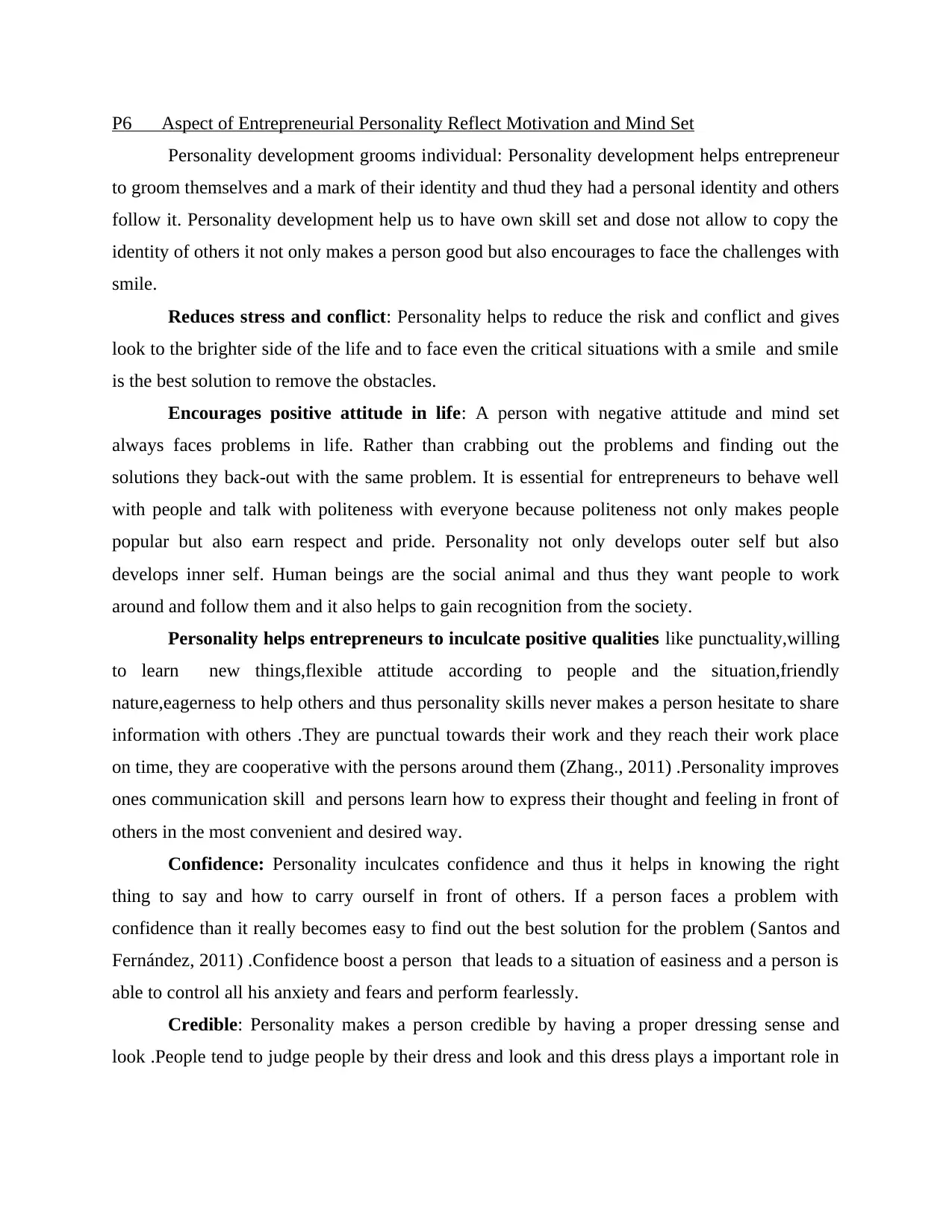
P6 Aspect of Entrepreneurial Personality Reflect Motivation and Mind Set
Personality development grooms individual: Personality development helps entrepreneur
to groom themselves and a mark of their identity and thud they had a personal identity and others
follow it. Personality development help us to have own skill set and dose not allow to copy the
identity of others it not only makes a person good but also encourages to face the challenges with
smile.
Reduces stress and conflict: Personality helps to reduce the risk and conflict and gives
look to the brighter side of the life and to face even the critical situations with a smile and smile
is the best solution to remove the obstacles.
Encourages positive attitude in life: A person with negative attitude and mind set
always faces problems in life. Rather than crabbing out the problems and finding out the
solutions they back-out with the same problem. It is essential for entrepreneurs to behave well
with people and talk with politeness with everyone because politeness not only makes people
popular but also earn respect and pride. Personality not only develops outer self but also
develops inner self. Human beings are the social animal and thus they want people to work
around and follow them and it also helps to gain recognition from the society.
Personality helps entrepreneurs to inculcate positive qualities like punctuality,willing
to learn new things,flexible attitude according to people and the situation,friendly
nature,eagerness to help others and thus personality skills never makes a person hesitate to share
information with others .They are punctual towards their work and they reach their work place
on time, they are cooperative with the persons around them (Zhang., 2011) .Personality improves
ones communication skill and persons learn how to express their thought and feeling in front of
others in the most convenient and desired way.
Confidence: Personality inculcates confidence and thus it helps in knowing the right
thing to say and how to carry ourself in front of others. If a person faces a problem with
confidence than it really becomes easy to find out the best solution for the problem (Santos and
Fernández, 2011) .Confidence boost a person that leads to a situation of easiness and a person is
able to control all his anxiety and fears and perform fearlessly.
Credible: Personality makes a person credible by having a proper dressing sense and
look .People tend to judge people by their dress and look and this dress plays a important role in
Personality development grooms individual: Personality development helps entrepreneur
to groom themselves and a mark of their identity and thud they had a personal identity and others
follow it. Personality development help us to have own skill set and dose not allow to copy the
identity of others it not only makes a person good but also encourages to face the challenges with
smile.
Reduces stress and conflict: Personality helps to reduce the risk and conflict and gives
look to the brighter side of the life and to face even the critical situations with a smile and smile
is the best solution to remove the obstacles.
Encourages positive attitude in life: A person with negative attitude and mind set
always faces problems in life. Rather than crabbing out the problems and finding out the
solutions they back-out with the same problem. It is essential for entrepreneurs to behave well
with people and talk with politeness with everyone because politeness not only makes people
popular but also earn respect and pride. Personality not only develops outer self but also
develops inner self. Human beings are the social animal and thus they want people to work
around and follow them and it also helps to gain recognition from the society.
Personality helps entrepreneurs to inculcate positive qualities like punctuality,willing
to learn new things,flexible attitude according to people and the situation,friendly
nature,eagerness to help others and thus personality skills never makes a person hesitate to share
information with others .They are punctual towards their work and they reach their work place
on time, they are cooperative with the persons around them (Zhang., 2011) .Personality improves
ones communication skill and persons learn how to express their thought and feeling in front of
others in the most convenient and desired way.
Confidence: Personality inculcates confidence and thus it helps in knowing the right
thing to say and how to carry ourself in front of others. If a person faces a problem with
confidence than it really becomes easy to find out the best solution for the problem (Santos and
Fernández, 2011) .Confidence boost a person that leads to a situation of easiness and a person is
able to control all his anxiety and fears and perform fearlessly.
Credible: Personality makes a person credible by having a proper dressing sense and
look .People tend to judge people by their dress and look and this dress plays a important role in
Paraphrase This Document
Need a fresh take? Get an instant paraphrase of this document with our AI Paraphraser
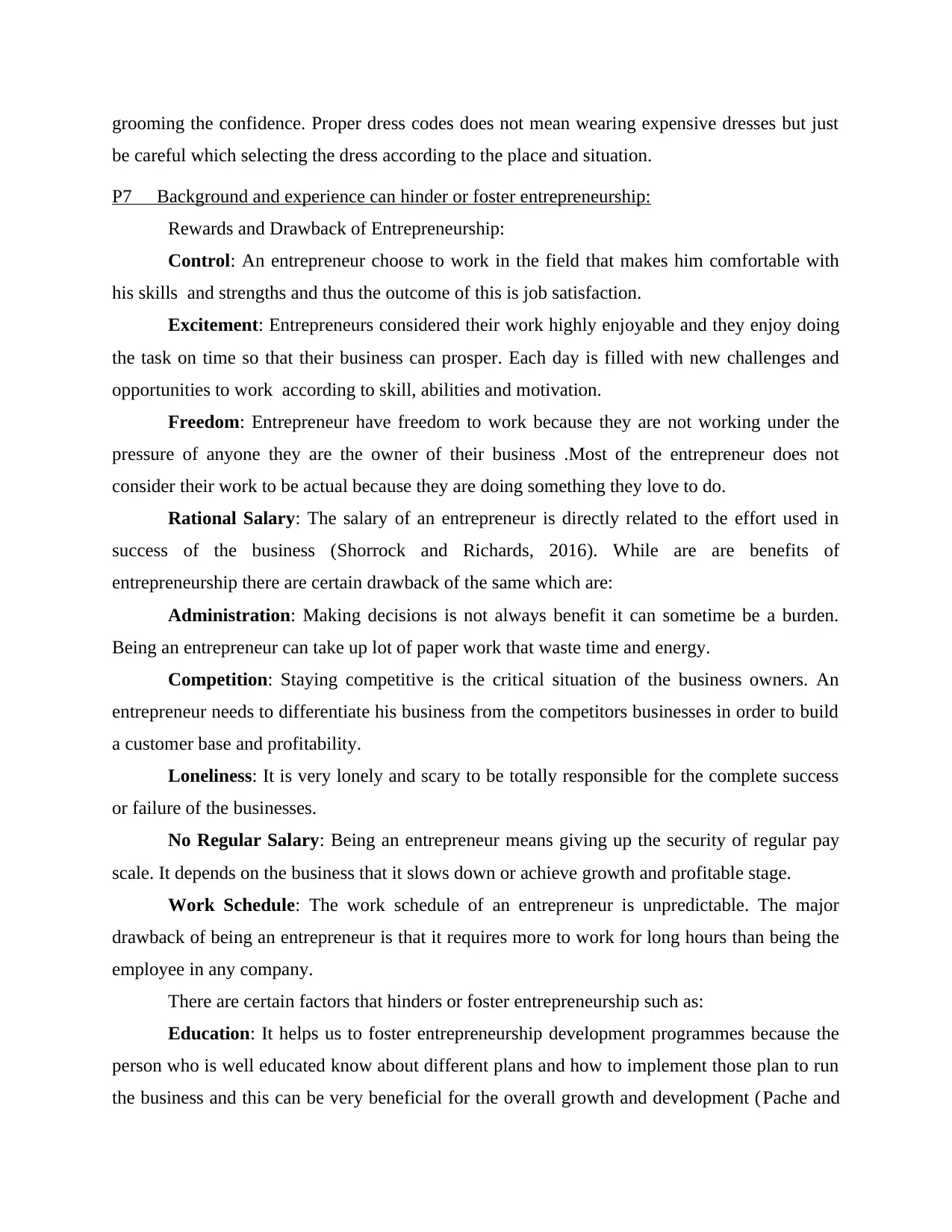
grooming the confidence. Proper dress codes does not mean wearing expensive dresses but just
be careful which selecting the dress according to the place and situation.
P7 Background and experience can hinder or foster entrepreneurship:
Rewards and Drawback of Entrepreneurship:
Control: An entrepreneur choose to work in the field that makes him comfortable with
his skills and strengths and thus the outcome of this is job satisfaction.
Excitement: Entrepreneurs considered their work highly enjoyable and they enjoy doing
the task on time so that their business can prosper. Each day is filled with new challenges and
opportunities to work according to skill, abilities and motivation.
Freedom: Entrepreneur have freedom to work because they are not working under the
pressure of anyone they are the owner of their business .Most of the entrepreneur does not
consider their work to be actual because they are doing something they love to do.
Rational Salary: The salary of an entrepreneur is directly related to the effort used in
success of the business (Shorrock and Richards, 2016). While are are benefits of
entrepreneurship there are certain drawback of the same which are:
Administration: Making decisions is not always benefit it can sometime be a burden.
Being an entrepreneur can take up lot of paper work that waste time and energy.
Competition: Staying competitive is the critical situation of the business owners. An
entrepreneur needs to differentiate his business from the competitors businesses in order to build
a customer base and profitability.
Loneliness: It is very lonely and scary to be totally responsible for the complete success
or failure of the businesses.
No Regular Salary: Being an entrepreneur means giving up the security of regular pay
scale. It depends on the business that it slows down or achieve growth and profitable stage.
Work Schedule: The work schedule of an entrepreneur is unpredictable. The major
drawback of being an entrepreneur is that it requires more to work for long hours than being the
employee in any company.
There are certain factors that hinders or foster entrepreneurship such as:
Education: It helps us to foster entrepreneurship development programmes because the
person who is well educated know about different plans and how to implement those plan to run
the business and this can be very beneficial for the overall growth and development (Pache and
be careful which selecting the dress according to the place and situation.
P7 Background and experience can hinder or foster entrepreneurship:
Rewards and Drawback of Entrepreneurship:
Control: An entrepreneur choose to work in the field that makes him comfortable with
his skills and strengths and thus the outcome of this is job satisfaction.
Excitement: Entrepreneurs considered their work highly enjoyable and they enjoy doing
the task on time so that their business can prosper. Each day is filled with new challenges and
opportunities to work according to skill, abilities and motivation.
Freedom: Entrepreneur have freedom to work because they are not working under the
pressure of anyone they are the owner of their business .Most of the entrepreneur does not
consider their work to be actual because they are doing something they love to do.
Rational Salary: The salary of an entrepreneur is directly related to the effort used in
success of the business (Shorrock and Richards, 2016). While are are benefits of
entrepreneurship there are certain drawback of the same which are:
Administration: Making decisions is not always benefit it can sometime be a burden.
Being an entrepreneur can take up lot of paper work that waste time and energy.
Competition: Staying competitive is the critical situation of the business owners. An
entrepreneur needs to differentiate his business from the competitors businesses in order to build
a customer base and profitability.
Loneliness: It is very lonely and scary to be totally responsible for the complete success
or failure of the businesses.
No Regular Salary: Being an entrepreneur means giving up the security of regular pay
scale. It depends on the business that it slows down or achieve growth and profitable stage.
Work Schedule: The work schedule of an entrepreneur is unpredictable. The major
drawback of being an entrepreneur is that it requires more to work for long hours than being the
employee in any company.
There are certain factors that hinders or foster entrepreneurship such as:
Education: It helps us to foster entrepreneurship development programmes because the
person who is well educated know about different plans and how to implement those plan to run
the business and this can be very beneficial for the overall growth and development (Pache and
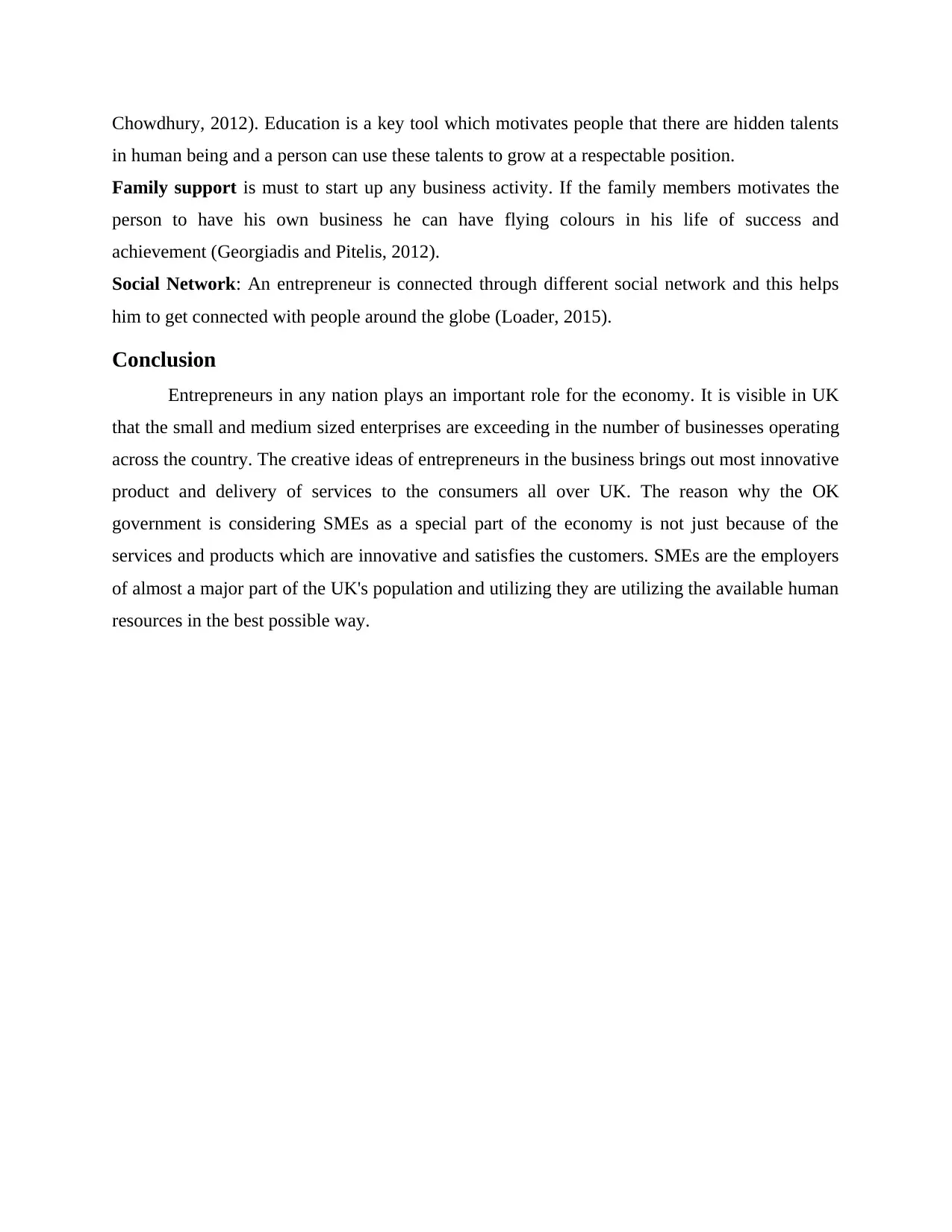
Chowdhury, 2012). Education is a key tool which motivates people that there are hidden talents
in human being and a person can use these talents to grow at a respectable position.
Family support is must to start up any business activity. If the family members motivates the
person to have his own business he can have flying colours in his life of success and
achievement (Georgiadis and Pitelis, 2012).
Social Network: An entrepreneur is connected through different social network and this helps
him to get connected with people around the globe (Loader, 2015).
Conclusion
Entrepreneurs in any nation plays an important role for the economy. It is visible in UK
that the small and medium sized enterprises are exceeding in the number of businesses operating
across the country. The creative ideas of entrepreneurs in the business brings out most innovative
product and delivery of services to the consumers all over UK. The reason why the OK
government is considering SMEs as a special part of the economy is not just because of the
services and products which are innovative and satisfies the customers. SMEs are the employers
of almost a major part of the UK's population and utilizing they are utilizing the available human
resources in the best possible way.
in human being and a person can use these talents to grow at a respectable position.
Family support is must to start up any business activity. If the family members motivates the
person to have his own business he can have flying colours in his life of success and
achievement (Georgiadis and Pitelis, 2012).
Social Network: An entrepreneur is connected through different social network and this helps
him to get connected with people around the globe (Loader, 2015).
Conclusion
Entrepreneurs in any nation plays an important role for the economy. It is visible in UK
that the small and medium sized enterprises are exceeding in the number of businesses operating
across the country. The creative ideas of entrepreneurs in the business brings out most innovative
product and delivery of services to the consumers all over UK. The reason why the OK
government is considering SMEs as a special part of the economy is not just because of the
services and products which are innovative and satisfies the customers. SMEs are the employers
of almost a major part of the UK's population and utilizing they are utilizing the available human
resources in the best possible way.
⊘ This is a preview!⊘
Do you want full access?
Subscribe today to unlock all pages.

Trusted by 1+ million students worldwide
1 out of 14
Related Documents
Your All-in-One AI-Powered Toolkit for Academic Success.
+13062052269
info@desklib.com
Available 24*7 on WhatsApp / Email
![[object Object]](/_next/static/media/star-bottom.7253800d.svg)
Unlock your academic potential
Copyright © 2020–2026 A2Z Services. All Rights Reserved. Developed and managed by ZUCOL.





